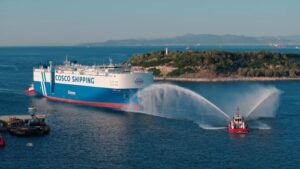The International Chamber of Shipping (ICS) has called upon governments to prioritise seafarers and frontline maritime workers as they roll out COVID-19 vaccines to avoid a second crew change crisis.
In a statement, the ICS said that governments, who are once again restricting travel as a reaction to new COVID-19 mutations, should recognise the vital role seafarers play in the supply chain.
The ICS went on to say that shipping and seafarers will become more important in 2021 as more vaccines and medical supplies, including syringes and personal protective equipment (PPE), are transported.
However, COVID-19 related restrictions have forced hundreds of thousands of workers to overrun their contracts, raising concerns over ship safety, crew fatigue and access to healthcare.
Seafarers are currently being severely impacted by crew change crisis, with some approaching two years stuck at sea, the ICS said.
According to the ICS, there is real concern that, under new restrictions, this number will rapidly increase rather than reduce.
While more than 40 countries have so far recognised seafarers as key workers, most seafaring nations have not, creating growing demand from within industry for new solutions to the issue of vaccine distribution, before the humanitarian crisis facing seafarers gets any worse.
The spread of new variants of COVID-19 in Brazil, South Africa and the UK is contributing to stricter crew change restrictions globally. The Philippines, for example, has expanded its temporary crew change ban to 35 countries, barring foreign seafarers from disembarking at Philippine ports.
The UK has banned travellers from South America, and the US has also toughened its entry requirements. This is part of a wider global retrenchment around ease of travel, which the shipping industry fears could result in hundreds of thousands of seafarers becoming the collateral damage of government inaction.
Guy Platten, Secretary General of the ICS, commented, “The benefits of vaccinating those responsible for transporting the vaccine and PPE around the world should be obvious.
“Governments must class seafarers as ‘key workers’ and give them priority access to the vaccine, as the inability to rotate crews from their ships risks the passage of the critical medical materials needed for the global vaccination effort.
“If we want to maintain global trade, seafarers must not be put to the back of the vaccine queue. Governments will not be able to inject their citizens without the shipping industry or, most importantly, our seafarers.”
Singapore recently announced it would become one of the first major seagoing countries to prioritise maritime workers for COVID-19 vaccines.








